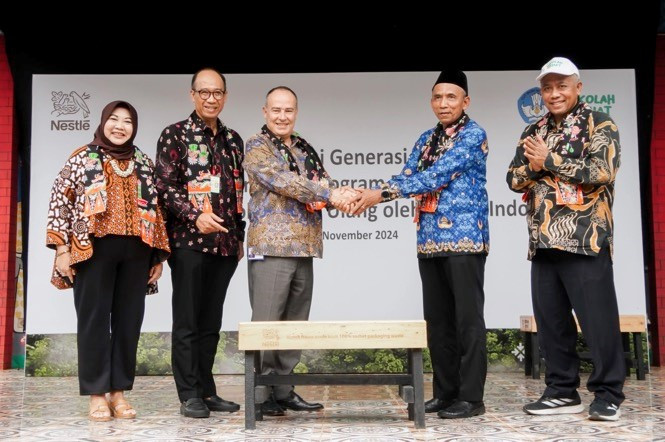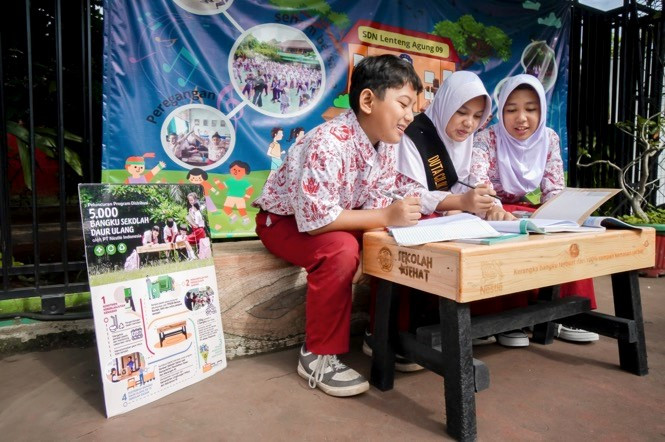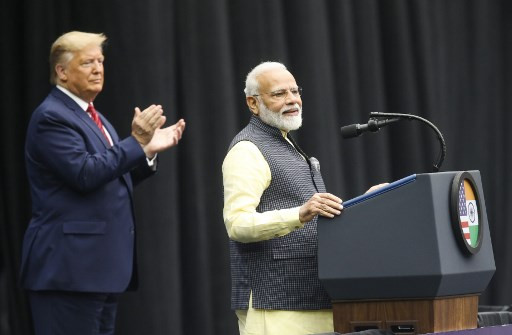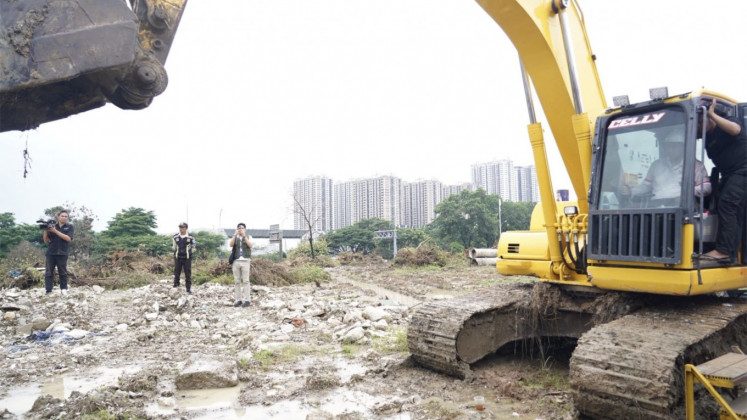Popular Reads
Top Results
Can't find what you're looking for?
View all search resultsPopular Reads
Top Results
Can't find what you're looking for?
View all search resultsNestlé Indonesia distributes recycled bench to schools in pursuit of sustainability
Change text size
Gift Premium Articles
to Anyone
 PT Nestlé Indonesia President Director Samer Chedid (third left) shakes hands with Sarwoko, Head of the South Jakarta Education Subdepartment Region II, while symbolically handing over a school bench made from postconsumer recycled plastic at a ceremony on Nov. 29 in Jakarta. Also pictured are (from left) Nestlé Indonesia Corporate Affairs & Sustainability Director Sufintri Rahayu, Waste Management Director Agus Supriyanto of the Environment Ministry and Healthy Schools Movement (GSS) Partnership lead Catur Budi Santoso of the Elementary and Secondary Education Ministry. (Courtesy of PT Nestlé Indonesia)
PT Nestlé Indonesia President Director Samer Chedid (third left) shakes hands with Sarwoko, Head of the South Jakarta Education Subdepartment Region II, while symbolically handing over a school bench made from postconsumer recycled plastic at a ceremony on Nov. 29 in Jakarta. Also pictured are (from left) Nestlé Indonesia Corporate Affairs & Sustainability Director Sufintri Rahayu, Waste Management Director Agus Supriyanto of the Environment Ministry and Healthy Schools Movement (GSS) Partnership lead Catur Budi Santoso of the Elementary and Secondary Education Ministry. (Courtesy of PT Nestlé Indonesia)
A
s part of its ongoing commitment to the environment, PT Nestlé Indonesia is steadfast in its efforts to distribute 5,000 school benches crafted from postconsumer recycled plastic. In the initial stage, a total of 720 recycled benches will be thoughtfully allocated to 72 elementary schools across DKI Jakarta, Pringsewu Regency, Tanggamus Regency, Bandar Lampung City, Sukabumi Regency, and Karawang Regency. This initiative serves as a testament to PT Nestlé Indonesia's ongoing commitment to fostering a greener future and promoting responsible waste management practices.
Furthermore, to complement this distribution effort, educational sessions were conducted for both elementary school students and teachers. These sessions focused on the significance of waste reduction and sorting for students, while teachers were provided with valuable insights on waste management within school premises. The selection of the 72 target schools was a collaborative effort between Nestlé Indonesia and the Education Ministry, taking into account relevant criteria.
These criteria included schools that are actively involved in the Healthy Schools Movement (GSS) initiated by the Elementary and Secondary Education Ministry. These schools demonstrate a strong commitment to implementing the pillars of the GSS program and are conveniently located within Nestlé Indonesia's operational area. Additionally, other schools that have already embraced the Nestlé Healthy Kids program were chosen, ensuring their readiness and capacity to effectively educate students on waste management and environmental sustainability.
Nestlé Indonesia’s program supports the GSS, especially the "Healthy Environment" pillar, which emphasizes the importance of the Reduce, Reuse, Recycle (3R) movement, along with the waste management program of the Environment Ministry.
According to Nestlé Indonesia President Director Samer Chedid, waste management has become an important, highly relevant aspect of our daily lives. Providing education to children from an early age is therefore crucial in building sustainable environmental awareness.
“Through this program, we hope to inspire students and teachers to play an active role in protecting the environment. This can be started by instilling a sense of responsibility for waste management,” he said.
“One of the first steps that can be taken is to encourage each student to collect and sort plastic waste, which can then be [...] processed into recycled products, such as benches and other useful items,” said Chedid.
Pinggir Sumarsono, the principal of SDN Cilandak Barat 03 state elementary school in South Jakarta, expressed his appreciation for Nestlé Indonesia’s initiative.
"This program is extraordinary, because it can provide education and foster a sense of [environmental] care among the students from an early age. I hope this program will continue and can be implemented in all other schools in Indonesia," he said.
Nestlé Indonesia Corporate Affairs & Sustainability Director Sufintri Rahayu said that through this program, the company hoped to instill awareness and a spirit of sustainability in the younger generation, who would become agents of change in creating a cleaner, more environmentally friendly future.
“We are committed to continuing to seek innovation in waste management and supporting a circular economy, as well as inviting the community to promote waste wise behavior. Together with the government, partners and the community, we are optimistic that we can realize a more sustainable Indonesia for future generations," she said.
From waste to benefits
Students of SDN Cilandak Barat 03 state elementary school in South Jakarta use a bench made from postconsumer recycled plastic as they learn about environmental awareness and waste management as part of PT Nestlé Indonesia’s holistic sustainability program, as part of the global company’s campaign to reduce plastic waste and cultivate agents of change among the younger generation in support of the development of a circular economy. Each bench is made from around 25 kilograms of postconsumer recycled plastic, processed by Abbas Plastindo from household waste collected by the Baraya Runtah 3R waste management material recovery facility (MRF), Sustainable Waste Indonesia (SWI) as well as partner traders, topped with a seat made from used wooden crates.(Courtesy of PT Nestlé Indonesia)Nestlé Indonesia collaborates with stakeholders such as the Sahabat Lingkungan community empowerment group (KSM), the group’s Baraya Runtah 3R waste management material recovery facility (MRF) and Sustainable Waste Indonesia (SWI), as well as partner traders and recyclers in its aim to increase the number of facilities that manage plastic waste and ensure optimal waste processing.
KSM Sahabat Lingkungan chairman Hendro Wibowo recounted the group’s journey with PT Nestlé Indonesia since 2019, with particular emphasis on the company’s continuous cooperation and support in helping its efforts to create a community-based circular economy.
“In 2021, together with the Karawang regency administration, we built the MRF Baraya Runtah facility in Sukaluyu village, West Java. Operational activities at the MRF, from collecting and sorting to recycling waste, currently reaches a capacity of up to three tonnes per day,” Hendro said.
“The waste processing facility also has created 25 jobs for local residents and supports 4,500 households and local businesses.”
The Baraya Runtah facility collects plastic waste and sorts them for processing further by recycling firm Abbas Plastindo, which melts the waste to form plastic blocks and shapes them into bench frames for distributing to schools via the Nestlé Indonesia program. The seats are made of repurposed materials from used crates.
Each bench is made from around 25 kilograms of plastic bags and flexible plastics, sorted from the household waste managed at Baraya Runtah and the waste collected by partner traders.
The Environment Ministry’s Waste Management Director Agus Supriyanto expressed the ministry’s appreciation for the multi-stakeholder collaboration, commending it as a breakthrough to reduce waste by recycling it to produce new and useful items.
“We encourage all producers who use [plastic] packaging to take responsibility for managing their waste, not just letting it end up in landfills. In addition, we also invite the public to adopt a low waste lifestyle, such as avoiding the use of single-use plastic, bringing their own shopping bags, finishing food, sorting waste at home and composting organic waste,” said Agus.
“Climate change is a reality that is already in front of us, so let's act together for a better future."
Through an educational approach, the program also supports the GSS, which aims to instill environmentally friendly habits among the younger generation and motivate students to become active agents of change in creating a cleaner, more sustainable future.
GSS Partnership lead Catur Budi Santoso of the Primary and Secondary Education Ministry said there was a need to continue spreading the GSS campaign to the wider community, especially to educational institutions.
“On this occasion, I would like to thank PT Nestlé Indonesia and its partner, SPEAK Indonesia, which has played a role in the recycled plastic bench distribution program as well as in educating students and teachers about the importance of waste management [to avoid] polluting the environment,” Catur said.
“Let us continue to increase awareness of clean and healthy lifestyle behaviors in [school] environments through the implementation of Healthy Nutrition, Healthy Body, Healthy Immunization, Healthy Minds and Healthy Environment. It is hoped that this will improve the quality of learning so it can nurture Indonesian children who are healthy, smart, strong and possess character.”
In striving to realize zero emissions by 2050, PT Nestlé Indonesia is committed to sustainability efforts in various sectors, particularly in relation to climate change, packaging, supply and water management.
In sustainable packaging and waste management, the company has established 15 MRF and integrated waste disposal sites (TPST) in three provinces to ensure that household waste does not end up in landfills. It has also partnered with 36 small and medium-scale industrial traders and recyclers in five provinces as of 2021 to increase the number of waste processing facilities, and promotes a waste wise lifestyle through its multi-sector Waste Dropbox and Waste Station programs.
PT Nestlé Indonesia is a member of the Indonesia Packaging Recovery Organization (IPRO), a voluntary, independent nonprofit that focuses on cross-industry waste management development.
Source : Nestle











